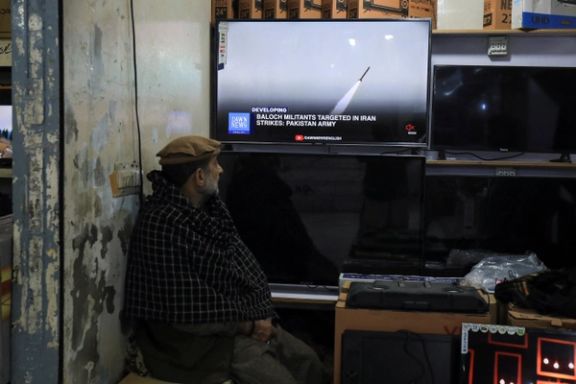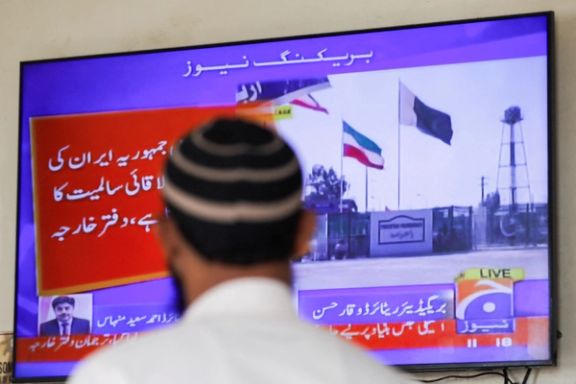Iran, Pakistan Try To Downplay Tension After Cross-Border Attacks

Iran and Pakistan both conducted airstrikes on each other's territories but both claim that they respect their neighbor’s territorial integrity.

Iran and Pakistan both conducted airstrikes on each other's territories but both claim that they respect their neighbor’s territorial integrity.
Pakistan launched airstrikes against several locations in southeastern Iran early Thursday, one day after Iran’s Revolutionary Guards hit targets inside the Pakistani territory.
The statements issued by both sides emphasized that the attacks were meant to target “terrorist hideouts” and not the civilians. Several children and women were killed in both attacks. Iran’s IRGC claimed their missiles and suicide drones targeted two bases of the Sunni militant group Jaish al-Adl while Pakistan claimed the operation was against “Sarmachar,” a term that means insurgents or rebels in general. Iranian officials have rejected Islamabad’s allegations about the presence of Pakistani terrorists in the city where the attack took place.
The cross-border attacks have escalated tensions between Iran and Pakistan although both countries insist that Baloch separatist factions were the main target of the strikes.
Pakistani President Arif Alvi on Thursday said his country fully respects the sovereignty and territorial integrity of all states and expects the same from other nations not to violate international law. Alvi said that Pakistan and Iran are "brotherly countries and they needed to resolve issues through dialogue and mutual consultation."

"The sole objective of today's act was in pursuit of Pakistan's own security and national interest, which is paramount and cannot be compromised,” Pakistan's foreign ministry said. A senior Pakistani security official told Reuters the military was on "extremely" high alert and would meet any "misadventure" from the Iranian side forcefully.
"The information received indicates that four children, three women and two men, who were foreign nationals, have been killed in the explosion that occurred in a village," Iran's Interior Minister Ahmad Vahidi told state TV.
Iran's foreign ministry said in a Thursday statement that Tehran was committed to good neighborly relations with Pakistan, but called on the neighboring state to prevent the establishment of "terrorist bases" on its soil.
The US State Department condemned the Iranian airstrike in Pakistan as well as its attacks in Iraq and Syria occurred earlier in the week, urging a peaceful resolution to the escalating tensions in the region. Similarly, Russia's foreign ministry on Thursday called on Iran and Pakistan to show maximum restraint and solve their differences through diplomacy or risk playing into the hands of those who would like to see the region descend into chaos.
Russian Foreign Ministry spokeswoman Maria Zakharova in a statement noted that the two countries are part of the Shanghai Cooperation Organization (SCO), a grouping that Russia helped found. "It is regrettable that this is happening between friendly SCO countries, with which we are developing partnership relations. Further aggravation of the situation plays into the hands of those who are not interested in peace, stability and security in the region," said Zakharova.
In response to the attacks, the European Union expressed its deep worries about the “spiral of violence in the Middle East and beyond.” EU spokesman Peter Stano said, “These attacks, including in Pakistan in Iraq and Iran now are of utmost concern for the European Union because they violate the sovereignty and territorial integrity of countries, and they have also a destabilizing effect on the region.”
In addition to calls for restraint on both sides, there is a hot debate on social media about rumors that Tehran and Islamabad coordinated the attacks with each other. Public figures close to Iran’s Revolutionary Guard, such as former lawmaker Hamid Rasaei and interrogator-journalist Ameneh Sadat Zabihpour, try to project the idea that the two neighboring Muslim countries coordinated the attacks. However, the idea has also backfired online, with people and journalists saying that if the two were aware of the attacks, why hadn’t they removed the civilian population from the target points.
Iran and Pakistan have a history of strained relations due to security concerns along their 900-kilometer border. Although Tehran and Islamabad’s attacks are ostensibly aimed at “terrorist” militants, the unprecedented cross border fires can serve as a message that the two brotherly countries can easily escalate to a serious conflict.
According to Mustafa Nawaz Khokhar, a former Pakistani senator, the Islamic Republic’s attack is only a drama to hide the regime’s “cowardice in front of Iranian people.” “It is a pity that the Iranian rulers chose this path.”